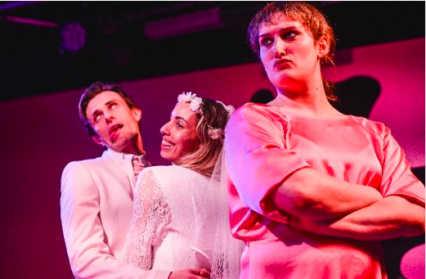Cerys-Leigh Phipps reviews REVOLT. SHE SAID, REVOLT AGAIN, a multi-faceted performance which considers the power structures which rule and interfere with the lives of women.
Surviving the 21st century is becoming increasingly challenging for the modern woman and Alice Birch’s REVOLT. SHE SAID, REVOLT AGAIN is exposing that struggle. Loud, proud, and unstoppable, this piece of theatre is one of protest. Protest to every societal expectation placed upon women’s already heavy shoulders. From sexual objectification, mistreatment in the workplace to the breakdown of family relationships due to abuse, this production leaves no stone unturned, no issue unexposed. This play is not for the faint-hearted, with a graphic content warning – this is a production which does not hold back; it deals with real issues, even when they get messy.
From lighting to costumes to dialogue, REVOLT has little interest in subtlety. The audience is welcomed by vivid pink set pieces accompanied by vibrant pink stage lighting. The intimate setting uses traverse staging, allowing the audience to watch each other as well as the action. This also creates the feeling that the actors are performing to each audience member directly while loud, high-energy music begins to play. With the mix of colours and beats, everything that was once seen as “girly” or “dainty” has been reimagined as something strong and powerful; the revolt against the female struggle has already begun.
Exposure is the play’s driving force, with this theme even applying to the actors and the production itself. Alongside the set pieces, the backstage area is brought into the performance, with the costume rail and props being obviously visible to the audience. This clever and symbolic piece of staging allows the audience to watch costume changes and other backstage practices. Through exposing the production and creation of the play, the piece blurs its issues with what is real and happening right now in our current society. These are not just fictional scenarios written for entertainment, and their presence only immerses the audience into the action more.
The episodic structure of the performance also adds to this immersion. With the actors taking on new characters in each scene, each new episode deals with a different issue of female struggle in the modern world. Although not on stage for long, this system of multi-rolling allows for each new character to tell their story of hardship while still making a connection with the audience (while sometimes making the structure difficult to comprehend). With actors flitting between characters, it can be hard to keep a finger to the pulse of the action. Nevertheless, REVOLT is well-cast and the actors do justice to the vast array of characters, rendering each one individual through their movements, accents, and gestures. Despite an array of serious and sometimes overwhelming topics, this performance is nothing short of hilarious, with a mixture of dark humour and direct jokes enlivening the show with an undercurrent of electricity. Indeed, it is through this comedy that the actors are able to expose the seriousness of the topics – moving the audience between hysterical fits of laughter and stunned silence in a matter of lines.
The significant issues of the sexual objectification of the female body are shown to the audience through a comedic, yet thought-provoking manner. Graphic in both their movement and dialogue, the play opens with two actors representing a conversation about their sexual desires for each other. His “I will” is constantly combatted by her “we will” displaying the inherent and thoughtless sexist authority of his language. There is also a re-enactment of the breakdown of families due to the abuse suffered by women, and the physical and mental repercussions of this suffering which reverberate until they’re felt throughout the family, too. Here the comedy of REVOLT fades from view in the face of real suffering.
With a lean 65 minute run time, this production swaps length of narrative for intensity of action. As the title suggests, this is theatre as a form of revolt; it showcases the realities and intricacies of female struggle while prompting self reflection: after all, what’s stopping us all from doing something about it?
REVOLT. SHE SAID. REVOLT AGAIN. will be playing at Cardiff’s The Other Room until 29 June.












